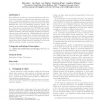148 search results - page 27 / 30 » Anti-jamming performance of cognitive radio networks |
138
click to vote
GLOBECOM
2008
IEEE
15 years 7 months ago
2008
IEEE
—Cooperative spectrum sensing has been shown to greatly improve the sensing performance in cognitive radio networks. However, if the cognitive users belong to different service p...
104
click to vote
JCM
2006
15 years 1 months ago
2006
- Current wireless systems are called vendor-central systems because, users should subscribe to a service provider (vendor) and receive the service through the spectrum assigned to...
128
click to vote
CORR
2007
Springer
15 years 1 months ago
2007
Springer
We consider a multi-channel opportunistic communication system where the states of these channels evolve as independent and statistically identical Markov chains (the Gilbert-Elli...
112
click to vote
VTC
2010
IEEE
14 years 11 months ago
2010
IEEE
Cognitive radios are devices capable of sensing a large range of frequencies in order to detect the presence of primary networks and reuse their bands when they are not occupied. D...
MOBICOM
2009
ACM
15 years 5 months ago
2009
ACM
We consider the problem of cross-band interference when devices from the same or different networks share radio spectrum. Cross-band interference occurs when unsynchronized trans...

